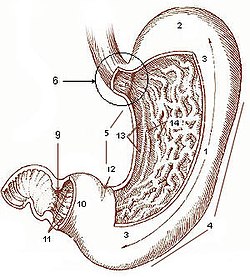Greater curvature
| Greater curvature of the stomach | |
|---|---|

Outline of stomach, showing its anatomical landmarks.
|
|

Diagram from cancer.gov Archived 31 December 2006 at the Wayback Machine.:
* 1. Body of stomach * 2. Fundus * 3. Anterior wall * 4. Greater curvature * 5. Lesser curvature * 6. Cardia * 9. Pyloric sphincter * 10. Pyloric antrum * 11. Pyloric canal * 12. Angular notch * 13. Gastric canal * 14. Rugal folds Work of the United States Government |
|
| Details | |
| Artery |
Greater: short gastric (upper part), left gastroepiploic (middle) Lesser: Right gastric artery and left gastric artery |
| Vein | Lesser: Right gastric vein and left gastric vein |
| Identifiers | |
| Latin | curvatura major gastris, curvatura minor gastris |
| Dorlands /Elsevier |
12272250, 12272259 |
| TA | A05.5.01.004 |
| FMA | 14574 |
|
Anatomical terminology
[]
|
|
The curvatures of the stomach refer to the greater and lesser curvatures. The greater curvature of the stomach is four or five times as long as the lesser curvature.
Starting from the cardiac orifice at the incisura cardiaca, it forms an arch backward, upward, and to the left; the highest point of the convexity is on a level with the sixth left costal cartilage.
From this level it may be followed downward and forward, with a slight convexity to the left as low as the cartilage of the ninth rib; it then turns to the right, to the end of the pylorus.
Directly opposite the incisura angularis of the lesser curvature the greater curvature presents a dilatation, which is the left extremity of the pyloric part; this dilatation is limited on the right by a slight groove, the sulcus intermedius, which is about 2.5 cm, from the duodenopyloric constriction.
The portion between the sulcus intermedius and the duodenopyloric constriction is termed the pyloric antrum.
At its commencement the greater curvature is covered by peritoneum continuous with that covering the front of the organ.
The left part of the curvature gives attachment to the gastrolienal ligament, while to its anterior portion are attached the two layers of the greater omentum, separated from each other by the gastroepiploic vessels.
There are three arteries which primarily supply the greater curvature:
and the gastroepiploic vessels:
The lesser curvature of the stomach, extending between the cardiac and pyloric orifices, forms the right or medial border of the stomach.
It descends as a continuation of the right margin of the esophagus in front of the fibers of the right crus of the diaphragm, and then, turning to the right, it crosses the first lumbar vertebra and ends at the pylorus.
...
Wikipedia
